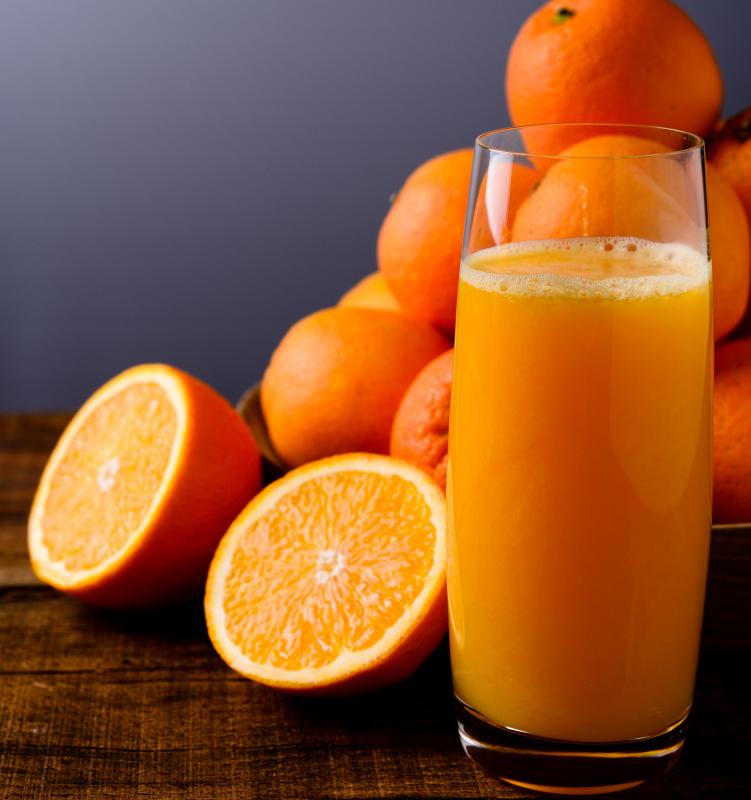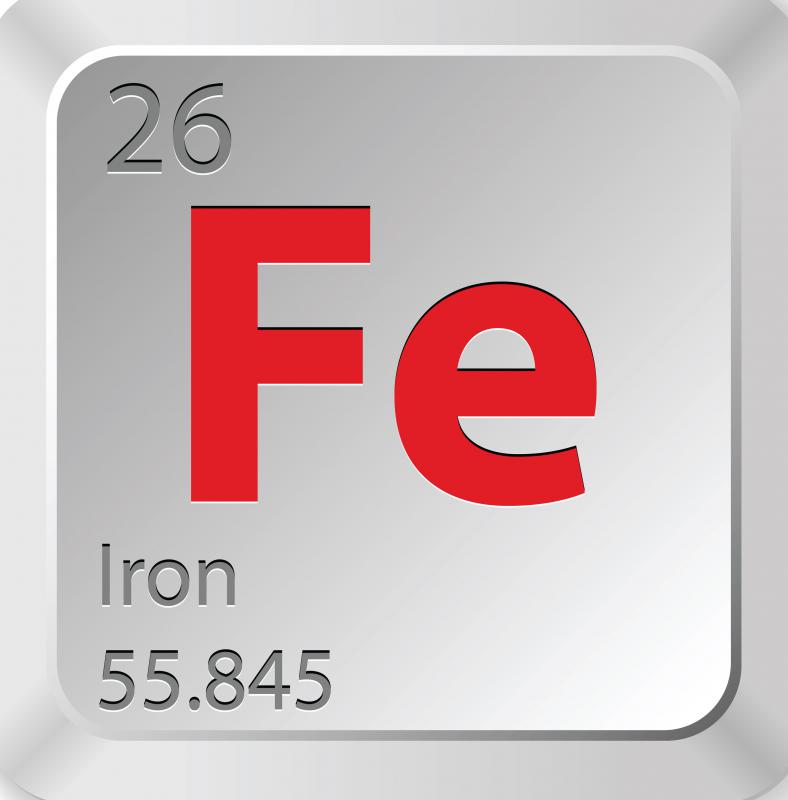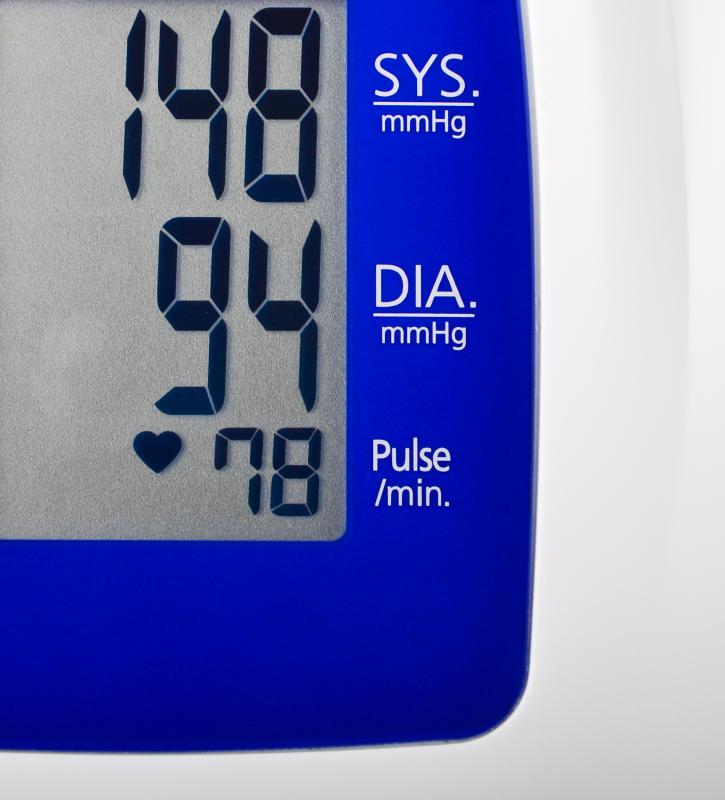At DelightedCooking, we're committed to delivering accurate, trustworthy information. Our expert-authored content is rigorously fact-checked and sourced from credible authorities. Discover how we uphold the highest standards in providing you with reliable knowledge.
What are Enriched Foods?
Enriched foods are foods that have had vitamins, minerals, or other nutritional elements added to them after processing. These nutritional elements are present naturally in the foods, but processing removes or reduces them. The process of enriching the food restores the original nutritional content. By contrast, fortified foods have had additional nutrients added that do not occur naturally in the food. Sugary cereals often are advertised as being fortified, but while the added vitamins are nutritionally sound, these foods still are not recommended due to the high sugar level.
There is some debate over whether enriched foods are as nutritionally beneficial as unprocessed foods. Many nutritionists believe that processed foods that have been enriched do not provide the same kind of nutritional benefit as the food in its natural form. Vitamins and minerals that are added after processing may not be as easily absorbed by the body, making them less beneficial. From a nutritional standpoint, others believe there is little difference between the two.

Common nutrients added to foods include vitamins, protein, iron, and potassium. Vitamin-enriched foods include milk, breads, and other foods made from processed flour. A variety of vitamins is often added to these foods, including vitamins D, A, C, and the family of B vitamins. Breads and pastas typically are iron-enriched foods because much of the nutritional value of the grain is removed to create white flour. Whole-grain products are more likely to maintain their original nutritional composition and are not as likely to be enriched, or they are enriched with fewer elements.

Potassium is another important nutrient that is often added to processed foods. Orange juice and other fruit juices are often potassium-enriched. For those with high blood pressure, potassium can be vital as sometimes hypertension is due to low potassium intake. Protein-enriched foods can be important for those on vegetarian diets, helping to keep the protein intake within the proper range. Foods such as soy products, especially soy-based meat substitutes, are often protein-enriched.

In general, higher quality nutrients can be obtained from food that is as close to its natural state as possible. Vitamins and other nutrients from fresh fruits and vegetables – as well as whole grains, nuts, seeds, and beans – are considered by many to be easier for the body to absorb. They also contain fiber and other micronutrients that are not present in processed versions of the same food. While enriched foods have a place in any balanced diet, most nutritionists agree that fresh foods are preferable.
AS FEATURED ON:
AS FEATURED ON:



















Discussion Comments
@Bluespirit -Wow I didn’t know that. I always try to buy foods that contain added vitamins and nutrients. For example, I love orange juice that contains a serving of calcium. Sometimes I want to switch it up a bit and have orange juice instead of milk in the morning, but I do need my calcium and this way I can have both.
I also found a white bread that has added calcium which is great for my kid’s lunches for school. What I really appreciate it when they add Omega 3 to the butter spread or the milk. I take Omega 3 fish pills for my cholesterol, but I also like to get additional Omega 3 in my food and there is only so much fish that you can eat.
There is really no excuse to not get your daily allotment of vitamins.
@Tomislav - I have read that as well, that no matter if you are eating enriched foods or whole foods you have to be careful about mild food allergies than can catch up to you in the long run.
One interesting food fact about oatmeal that was from an anecdote I read about in an article about a specific nutritionist’s practice, the nutritionist was surprised by the many people who became constipated secondary to eating oatmeal.
I would never have guessed that about oatmeal, and apparently neither did she as she described in the article.
@snickerish - I am actually not sure about the nutrient question, but I didn’t know that the nutrients in whole foods although the same nutrients as found in processed foods, were of lower quality until reading this article.
But one thing I have learned that I would like to add to this discussion is that just because it is healthy (yep, even if it is a whole food), it does not make it healthy for you as an individual.
I have read a few articles on this idea so I will try to summarize. Basically the idea is that everyone has different food allergies. And everyone has different reactions to the foods they are allergic to.
For example, if you eat shrimp and are allergic to shrimp your allergic reaction might be to break out into hives or have trouble breathing. These allergic reactions are easy to find.
However, some allergic reactions are more difficult. For example your allergic reaction to a certain food might be to have digestion issues which may be more difficult to pinpoint than when you break out into hives immediately after eating shrimp.
Finding the foods that are the most copacetic with my system has been what has helped my body the most!
I eat mostly vegetarian, but I still go with the idea of eating whole foods to get my daily intake of protein as opposed to eating protien enriched foods.
I have not gone so far as to read why whole foods' nutrients are better than the nutrients found in enriched foods but it just seems to make sense. Does anyone know the reason that the nutrients that are added are not as good of quality as nutrients that are found naturally in a food?
@alisha-- I'm not sure if 'unprocessed' foods are really cheaper to produce. First of all, all foods have to go through some kind of processing to turn it into a form that we can consume. Neither flour nor rice comes out of the farm ready to eat.
Secondly, synthetic vitamins and minerals are actually cheaper to produce than organic vitamins and minerals. I don't think it makes any difference for our bodies either. Why else would doctors recommend vitamin supplements? Most supplements are also made from synthetic vitamins.
I think enriched foods are perfectly fine and safe, and allow us to consume vitamins and minerals we wouldn't be getting otherwise.
I don't think that enriched foods are as beneficial or as healthy as more natural foods. At the end of the day, it's natural versus synthetic. The vitamins and minerals that enriched foods have were are produced synthetically in the laboratory. I don't believe that these can be as beneficial as eating foods with vitamins and minerals in their natural form.
If we think about it, processing foods and then enriching them makes little sense because it is costing us more money and time. Foods with little or no processing are not just healthier but will require less energy to produce.
Instead of keeping foods as is, we are first eliminating their good parts and then trying to put it back with unnatural substitutes. This doesn't make sense to me. I realize that it has to do with how foods taste and people preferring the taste of processed foods. But taste is something which can change and adapt. I'm sure everyone would get used to the flavor of natural and unprocessed foods in a short amount of time if they tried.
I remember hearing many times that the closer you can eat your food in its natural state, the more nutritious it is for you.
There are many foods that sound like they have been made better by processing, but I think there are better ways to get the nutrients they add when enriching foods.
If I want to eat protein enriched foods, I would rather eat a whole food that is high in protein such as an egg or grilled chicken breast than rely on protein enriched foods to get the protein I need.
It doesn't always work this way because there are times when I am in a hurry and will grab a protein bar on my way out the door. I don't think the source of protein is as good as a natural source, but figure it is better than junk food.
When I think of enriched foods, the first thing that usually comes to mind is enriched flour.
If you look at the label on many loaves of bread, the first ingredient listed is enriched flour. I never understood why they had to remove ingredients that are naturally in the grain and enrich them back to make it better.
Because it doesn't make any sense to me, I make sure the bread I buy is made from whole grains and has not been enriched. I don't think the processing and enriching makes the bread any more nutritious at all.
I have become a label reader when it comes to choosing which foods are going to give me the most nutrition naturally with as little processing as possible.
@Sara007 - If you are looking for something that will do wonders for your heart health you should try vitamin K enriched foods. Vitamin K is one of the essential vitamins that keeps your blood at the right consistency. While this isn't a concern for most people, having enough vitamin K certainly doesn't hurt. You get it mostly from leafy green vegetables and enriched foods.
As for your skin, anything enriched with vitamin E will do the trick, as that is largely responsible for your skin, hair and nail health. When I started out getting more vitamin E I really felt that my skin cleared up, and that my nails were a lot stronger. Plus, as a bonus my hair was shinier.
There are so many great examples of enriched foods at my supermarket that I always have trouble trying to figure out what to buy. I am on a bit of a health kick so I like to buy vitamin D enriched foods and fiber enriched foods.
I have read that the vitamin D really helps you in the winter time because it prevents you from suffering from seasonal affective disorder, while the fiber rich foods really help my digestive track to stay working at its best.
Can anyone recommend any other great enrichment to be on the lookout for? I really want to work on my heart health, and keeping my skin looking great.
@Kat919 - I don't totally disagree with you, but I think that enriched foods can have a place in a healthy diet. Not all enriched cereals re junky. A lot of high fiber foods are also enriched, including healthy cereals like Cheerios and Grape Nuts.
Enriched foods can be a good way to "sneak" extra nutrients into your diet or your children's. If you don't like milk, why not try calcium-enriched orange juice? Don't eat a lot if meat? Maybe a bowl of cereal that's iron-enriched. And if you drink some orange juice with it, the vitamin C will help your body absorb the iron.
I agree with you that we should all eat more whole foods, but realistically, that just isn't always possible!
I feel like enriched foods are just a bill of goods. Watch kids' TV and you'll see what I mean. All those junky breakfast cereals are fortified with all sorts of vitamins and minerals. Doesn't make them healthy!
I like to follow Michael Pollan's food rules. One of them is to avoid any food that makes health claims! Why? Because if it's making health claims, it's a packaged, processed food. Real, whole foods contain nutrients in their more readily absorbed natural state.
If you want to add vitamins and minerals to your breakfast cereal, top it with fruit!
Post your comments